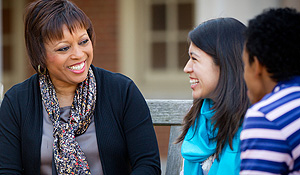Oakes attends session at Department of State
Barbee Myers Oakes, assistant provost for diversity and inclusion, recently attended a wisdom session at the U.S. Department of State focusing on the role of diversity and inclusion in foreign policy.
Oakes was invited as one of the top diversity and inclusion thought leaders in the U.S. to the meeting, which was hosted by The State Department, the International Society of Diversity and Inclusion Professionals, Inc., and the Society for Human Resource Management. The event came about because President Barack Obama signed an Executive Order titled “Establishing a Coordinated Government-Wide Initiative to Promote Diversity and Inclusion in the Federal Workforce.”
Oakes answered some questions for Inside WFU when she returned:
Q: What is the value of meeting with so many diversity and inclusion leaders?
A: Diversity and Inclusion thought leaders from corporate and higher education were invited to share their strategies to identify appropriate practices to improve the effectiveness of federal agency efforts to enhance diversity representation and retention among their workforce in compliance with President Obama’s Executive Order issued in August 2011
Q: What were the primary objectives of the meeting?
A: This event was hailed as a Call to Action to embrace diversity and inclusion as no longer being “nice things to do,” but as being mission-critical for federal agencies, national security, and international diplomacy. To this end, the State Department seeks to establish a partnership with D&I thought leaders to share and implement best practices on achieving diversity and inclusion at the global level and within all federal agencies.
Q: How will the Wake Forest community benefit from your participation in this event?
A: It was affirming to find that we at Wake Forest are considered to be leaders in formulating strategies to foster a diverse and inclusive campus community. For example, initiatives launched through the Office of Diversity and Inclusion such as the GateKeepers Workshop Initiative, Wake UP Winston Association, Student Inclusion Learning programs, and Diversity Pipeline Initiatives were considered to be best practices among many workshop participants and State Department representatives. I was asked to continue working with coordinators to expand the Inclusive Campus Model to the Global Community and also develop an assessment model on cultural competence skills.
Q: As a Wake Forest leader and a leader in higher ed, what were your most important contributions to the discussion?
A: First, I participated in a Workshop on Expanding the Inclusive Campus Model to the Global Community. Secondly, I was a member of the Working Group charged to address the Design Challenge: A Training Module on Diversity and U.S. Foreign Policy. We began and will continue working with the State Department to develop an assessment model on cultural competence skills to craft specific training modules for individuals and/or groups in the myriad agencies within the State Department.
Q: How can the U.S. share ideas regarding diversity and inclusion oversees? Why is this important?
A: Diversity in partnerships is how National Security Agency staff will do business in the future. As we post our people abroad, we need to ensure they have the skills, innovation and diversity needed to relate to diverse constituents. The importance of collaboration and communication across units was repeatedly addressed whether between government agencies, domestically, internationally, public-private partnerships, etc.
Q: Did a particular speaker or discussion make an impression on you? Why?
A: The way Dr. Ernest J. Wilson III, Dean, USC Annenberg School for Communication and Journalism, Walter H. Annenberg Chair in Communication and author of the book “Diversity and US Foreign Policy: A Reader,” framed the conversation was particularly impressive. For example, some of his key messages included ” If we win the effort to be inclusive, we win domestically and internationally and if we fail the effort to be inclusive …” “If you don’t have good talent and a supportive culture, strategy is worthless because you can’t effectively implement it.” “Diversity has always been prevalent; however, the issue today is the power shift. More diverse people have the kind of power that impacts global economy and security. Hence, cultural competence has become more essential than ever before.” “A very real benefit of increasing the number of underepresented minorities and underrepresented peoples in Foreign Policy are some non-traditional perspectives they bring to the conversation. For example, UR peoples are often used to being on the bottom and looking up or socially on the outside looking in. Thus, they are able to related to peoples from developing countries or from other cultures in ways affluent or privileged individuals are unable to do so.”
Categories: University Announcements

